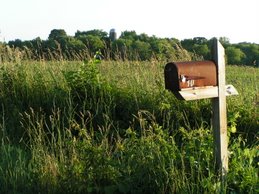I like the following comments, stolen from a newsletter by Jim Kunstler:
In the natural course of things, new buildings command premium prices precisely because they are new. Affordable housing, in the natural course of things, is prime housing that has gotten older. Historically this occurs in cycles. However, that cycle was interrupted after the Second World War -- and with it, the natural course of things...
If affordable housing is the gripe, there's one way that the city could create a lot of affordable housing, without any government subsidies, at the stroke of a pen: change the bylaws that restrict accessory apartments and rental out-buildings in the neighborhoods. This way, someone who is not in the market for a house -- a young single teacher or fireman -- could live in-town, and the homeowner-landlord would get an income stream to help cope with a high mortgage. You can specify that the landlord has to live on the premises. The idea that apartment dwellers destroy housing values in a neighborhood is not consistent with reality. It's another perverse hold-over from the last real-estate cycle during which there was so much demolition and little was replaced, except by one-story strip mall-style retail structures with no rental apartments in them. Another ironic result of all this is that government is now required to supply an artificial commodity called "affordable housing" to make up for the fact that almost no traditional downtown rental market housing was built in this country in the second half of the 20th century -- so it's not there getting older and becoming more affordable.
There will always be better and worse neighborhoods. An ideal of absolute social equality in all neighborhoods is probably unrealistic. There will be better and worse renters, too, and better and worse apartments. The cycle of home ownership may even change a lot in the years ahead. The relatively high rate of individual home ownership of recent years will very likely fall as the current mortgage mess works itself painfully out over the years ahead. It will become more normal -- less of a stigma -- to be renter. The benefits of home ownership for everybody have been over-hyped in recent years, especially as an unprecedented real estate up-market turns steeply down and property taxes go up.
-------------
Fitchburg’s near total focus on new development – partially understandable, I suppose – attempts to foster more diversity, but it’s a very limited spectrum. We want diversity if it’s a marketable, risk-free commodity with some cachet.
Fitchburg officials occasionally tout the city’s diversity, but it’s an empty boast. The city is heavily segregated by economic status and the new developments promise more of the same. There seems more potential for diversity in older neighborhoods, but the city’s focus is elsewhere.
I remembered an era when houses decayed along with their owners, adding a mosaic of diversity that would simply not be possible today. Get old or poor here and you have to get out. That is, I suppose, characteristic of most places in the U.S.
The thought of growing old in Fitchburg is still pretty depressing. Yes, we now have more places to eat, more places to live, and good sanitary sewers. It’s a good place to excavate, eat and evacuate.



No comments:
Post a Comment